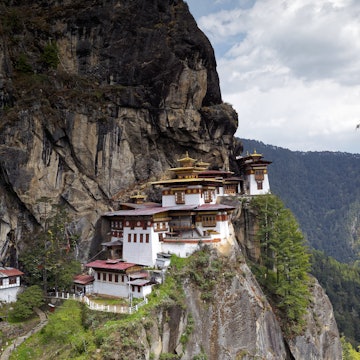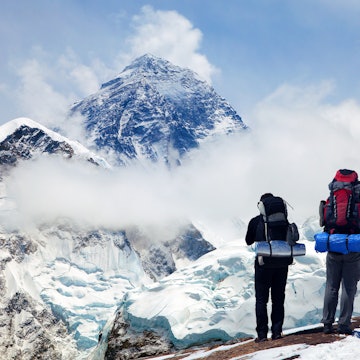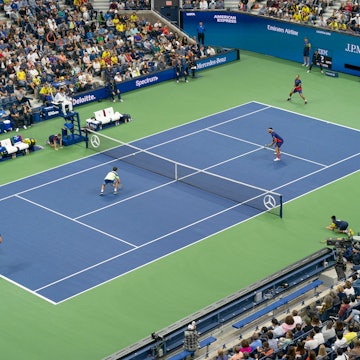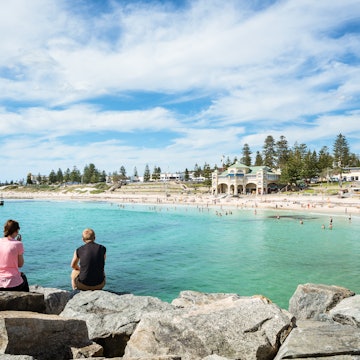
A traveler's guide to the Islamic holy month of Ramadan in 2024

Feb 29, 2024 • 4 min read

Here's what you need to know about the Islamic holy month in 2024 © Muslim Girl / Getty Images
The holy month of Ramadan is an important holiday of introspection and prayer for millions Muslims around the world.
The holiday celebrates the time when – according to Muslim beliefs – Muhammad the Prophet divinely received the very first verses of Islam’s holiest scripture, the Quran. However the ninth month of the lunar calendar was actually a significant time even before the advent of Islam in Arabia. During this time many people would retreat from the world to meditate and contemplate their relationship with God.
While Ramadan is popularly known as the month in which many Muslims across the globe fast during daylight hours, it is a special time for Muslims for a number of other reasons as well. Here's what you need to know about Ramadan.

History of Ramadan
The exact verses, believed to have been revealed to the Prophet Muhammad on the night known as the Night of Power or Laylat al-Qadr, now make up the start of Surah Al Alaq (the Blood Clot chapter) in the Quran. It was also during Ramadan that Muhammad’s fledgling community of Muslims won their first battle for survival against the Quraysh tribe of Makkah at the Battle of Badr.
Six years later, it was in the month of Ramadan that the Prophet Muhammad led that same community into Makkah, to reclaim the city they had been cast out of, and most significantly, cleanse the holy Ka’aba of its pre-Islamic idols, thus purifying it for the exclusive use of Muslims around the globe as the focal point of their daily worship.

When is Ramadan?
Ramadan’s start is dependent on the sighting of the moon’s new crescent, which means that the holiday can begin on different days in different Muslim communities. Some communities go with their own local sighting, while others take their lead from certain nations. Once the month does start, Muslims abstain from food, water and sexual intercourse during the day. This abstinence from the material and worldly indulgences is done in order to allow the nourishment of the soul as opposed to the body, which is why Muslims generally adopt a more pious and charitable attitude during Ramadan.
It is for this reason some Muslims will retreat from society during this month, going into isolation to meditate, pray, reflect and focus on their inner self, just as the Prophet once did. Ramadan is an annual opportunity for Muslims to pause, take stock and re-focus spiritually, while also enjoying the health benefits of fasting.
In 2024, Ramadan is expected to start on the evening of Sunday March 10 and end near Tuesday April 9.

How is Ramadan observed?
Fasting during the month of Ramadan is seen as obligatory by most Muslims around the world; many of whom deem it to be one of the key pillars of their faith. However not everyone has to fast: children, pregnant, nursing or menstruating women, those suffering from illness and those that are traveling are exempt. Every day in Ramadan fasting Muslims will begin their abstinence just before sunrise – usually by eating a light meal known as suhoor – and end it once the sun has set with a meal known as iftar.
In many countries large, elaborate and free public iftars take place in a bid to bring the community together and provide food for the neediest in society. The month of Ramadan is also a period of heightened charitable efforts by Muslims around the world.
During Ramadan, areas where there are large Muslim communities will often transition to an almost nocturnal society with many businesses and shops either shortening their operating hours or closing entirely. In some of these areas, visitors can also expect to hear mosques transmitting live recitation of the Quran throughout the day and attendance to the five daily prayers to increase considerably.
Most shops and businesses will reopen in the evenings around the time of iftar when the atmosphere begins to feel wonderfully festive. This continues late into the night with Muslims socializing in cafes and restaurants or attending the special late night Ramadan prayers observed in many societies.

Can non-Muslims participate in Ramadan celebrations?
Non-Muslims can engage respectfully in some of the nocturnal festivities, as it can be a wonderful way to experience a Muslim community. Non-Muslims are welcome to join public iftars and may be invited to attend private ones. Many restaurants have special Ramadan menus and buffets serving foods exclusively prepared for the holy month that non-Muslim patrons are welcome to sample.
In some places Ramadan festivals are put together with a schedule of cultural events that allow Muslims and non-Muslims to immerse themselves in the spirit of the month.
Ramadan concludes with the festival of Eid-al-Fitr, the "festival of breaking the fast," which is dedicated to spending time with loved ones, gift giving and breaking the month-long fast with elaborate and delicious meals. In 2024, Eid-al-Fitr is expected to be on or near April 9.













